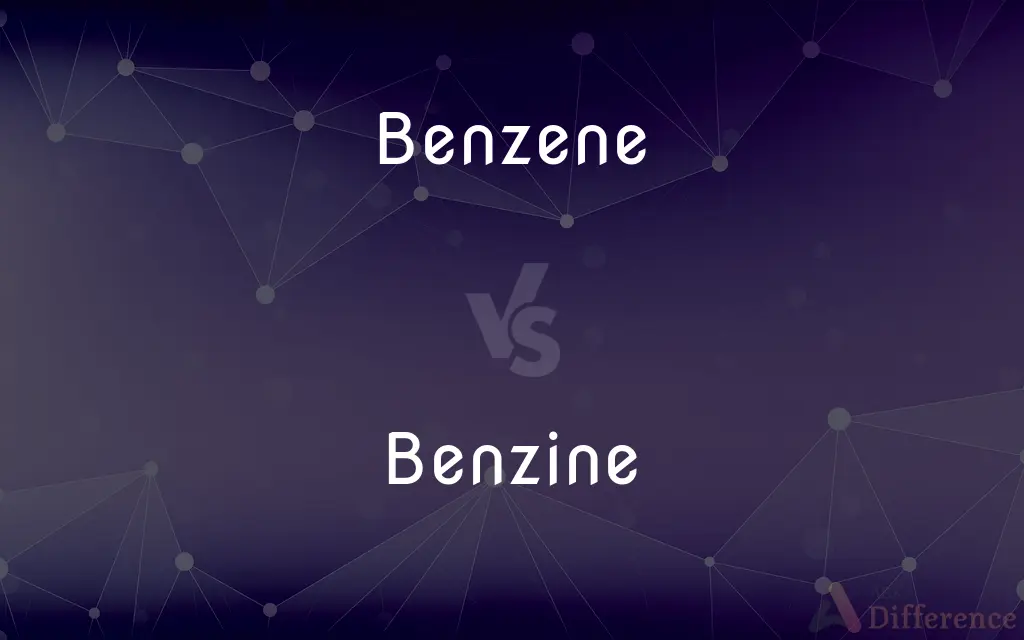Benzene vs. Benzine — What's the Difference?
Edited by Tayyaba Rehman — By Fiza Rafique — Updated on September 30, 2023
Benzene is a pure chemical compound (C6H6), often used as an industrial solvent. Benzine, on the other hand, is a general term for light petroleum distillates, similar to gasoline.

Difference Between Benzene and Benzine
Table of Contents
ADVERTISEMENT
Key Differences
Benzene is a simple aromatic ring compound, represented by the chemical formula C6H6. It is a clear, colorless liquid at room temperature and is primarily used as an intermediate to make other chemicals. Benzine, in contrast, isn't a specific chemical but a mix of hydrocarbons derived from petroleum.
Benzene is known for its ring structure, which gives it specific chemical properties. It is used in the production of many chemicals and is also found in crude oil and gasoline. Benzine, however, is a term that refers to a range of volatile flammable hydrocarbons used as solvents or fuels, often associated with gasoline or lighter fluid.
Benzene is a carcinogen and has been linked to several health issues, especially with prolonged exposure. Due to its toxicity, its use is regulated in many industries. Benzine, on the other hand, is a broad term and the specific health implications depend on the particular mix of hydrocarbons it contains.
The name "benzene" originates from "gum benzoin," a resin known for its aromatic characteristics. Benzine, alternatively, has its origins in the word "benzoin," but has since come to refer to those petroleum distillates due to similarities in their uses and properties.
Comparison Chart
Chemical Structure
A pure compound with formula C6H6
A mix of hydrocarbons from petroleum
ADVERTISEMENT
Use
Industrial solvent and in chemical production
Solvent, fuel, similar to gasoline
Toxicity
Carcinogen
Depends on specific hydrocarbon mix
Origin of Name
Derived from "gum benzoin"
Historically linked to "benzoin" but now means petroleum distillates
Common Synonyms
Aromatic hydrocarbon
Gasoline, naphtha, petrol ether
Compare with Definitions
Benzene
Benzene is a colorless, flammable liquid with a sweet odor and the chemical formula C6H6.
Benzene is an essential component in many chemical reactions in the industry.
Benzine
Benzine is a light, flammable petroleum distillate used mainly as a solvent or fuel.
Benzine is commonly used for cleaning and degreasing.
Benzene
Benzene is a carcinogenic compound found in crude oil and some industrial solvents.
Due to its harmful effects, exposure to benzene is regulated in workplaces.
Benzine
Benzine is often a synonym for gasoline or petrol in certain contexts.
He filled up his car with benzine before hitting the road.
Benzene
Benzene is a basic aromatic hydrocarbon that forms the basis for many other chemicals.
Benzene derivatives include phenol, aniline, and styrene.
Benzine
Benzine encompasses various hydrocarbons, often used for thinning oil-based paints.
For his art project, he thinned his paint using benzine.
Benzene
Benzene is a volatile compound that evaporates quickly into the air, making it a concern in environmental pollution.
The release of benzene from factories can contribute to air pollution.
Benzine
Benzine can refer to any mixture of liquid hydrocarbons derived from petroleum.
Different types of benzine have different refining processes and uses.
Benzene
Benzene is an organic chemical compound with the molecular formula C6H6. The benzene molecule is composed of six carbon atoms joined in a planar ring with one hydrogen atom attached to each.
Benzine
Benzine is a volatile liquid, which can evaporate quickly, especially when exposed to air.
Always store benzine in a closed container to prevent evaporation.
Benzene
A colorless, flammable, toxic, liquid aromatic hydrocarbon, C6H6, derived from petroleum and used in or to manufacture a wide variety of chemical products, including DDT, detergents, insecticides, and motor fuels. Also called benzol.
Benzine
See naphtha.
Benzene
(organic compound) An aromatic hydrocarbon of formula C6H6 whose structure consists of a ring of alternate single and double bonds.
Benzine
Benzene
Benzene
Sometimes used in place of the phenyl group.
Benzine
Any flammable petroleum distillate used as a solvent or fuel
Benzene
A volatile, very inflammable liquid, C6H6, contained in the naphtha produced by the destructive distillation of coal, from which it is separated by fractional distillation. The name is sometimes applied also to the impure commercial product or benzole, and also, but rarely, to a similar mixed product of petroleum.
Benzine
A liquid consisting mainly of the lighter and more volatile hydrocarbons of petroleum or kerosene oil, used as a solvent and for cleansing soiled fabrics; - called also petroleum spirit, petroleum benzine. Varieties or similar products are gasoline, naphtha, rhigolene, ligroin, etc.
Benzene
A colorless liquid hydrocarbon; highly inflammable; carcinogenic; the simplest of the aromatic compounds
Benzine
Same as Benzene.
Benzene
Benzene is a ringed structure with alternating double bonds, representing a cornerstone in organic chemistry.
Benzene's unique structure contributes to its stability and reactivity.
Benzine
A colorless liquid hydrocarbon; highly inflammable; carcinogenic; the simplest of the aromatic compounds
Common Curiosities
Is benzene a solid, liquid, or gas?
Benzene is a liquid at room temperature.
What is the chemical formula of benzene?
The chemical formula for benzene is C6H6.
Is benzine the same as gasoline?
Yes, in some contexts, benzine can refer to gasoline or petrol.
Can benzine be used as a cleaning agent?
Yes, benzine is often used as a solvent for cleaning and degreasing.
Which is more dangerous to health, benzene or benzine?
Benzene is a known carcinogen, but the health risks of benzine depend on its specific hydrocarbon mix.
Is benzene found in nature?
Yes, benzene is naturally found in crude oil and is also a component of volcanic emissions and forest fires.
Can benzene be found in everyday products?
Benzene used to be found in some consumer products, but due to health concerns, its presence has been reduced or eliminated.
What kind of bond structure does benzene have?
Benzene has a ring structure with alternating single and double bonds, making it an aromatic compound.
How is benzine produced?
Benzine is produced during the distillation of petroleum.
Are benzine and naphtha the same?
They are similar, but benzine generally refers to a lighter fraction of petroleum distillate, while naphtha can be broader in composition.
Is it safe to inhale benzene?
No, prolonged inhalation of benzene can be harmful and has been linked to several health issues.
Can benzine be used in lighters?
Yes, a form of benzine known as "lighter fluid" is used in some lighters.
How is benzene produced commercially?
Benzene is produced either from coal tar or as a by-product of petroleum refining.
What is the main use of benzine?
Benzine is primarily used as a solvent, in fuels, and for cleaning purposes.
Are both benzene and benzine flammable?
Yes, both benzene and benzine are highly flammable liquids.
Share Your Discovery

Previous Comparison
Rockabilly vs. Psychobilly
Next Comparison
Mandril vs. MandrelAuthor Spotlight
Written by
Fiza RafiqueFiza Rafique is a skilled content writer at AskDifference.com, where she meticulously refines and enhances written pieces. Drawing from her vast editorial expertise, Fiza ensures clarity, accuracy, and precision in every article. Passionate about language, she continually seeks to elevate the quality of content for readers worldwide.
Edited by
Tayyaba RehmanTayyaba Rehman is a distinguished writer, currently serving as a primary contributor to askdifference.com. As a researcher in semantics and etymology, Tayyaba's passion for the complexity of languages and their distinctions has found a perfect home on the platform. Tayyaba delves into the intricacies of language, distinguishing between commonly confused words and phrases, thereby providing clarity for readers worldwide.















































